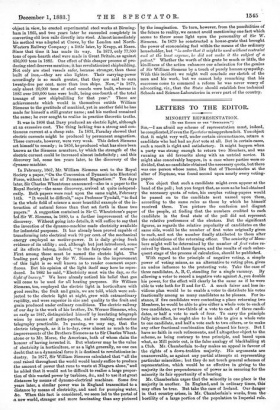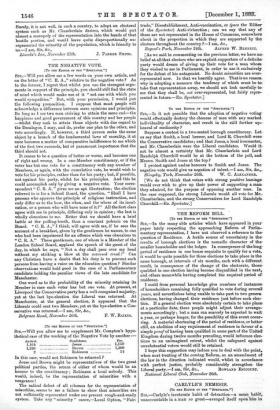LETTERS TO THE EDITOR.
MINORITY REPRESENTATION.
To THE EDITOR OF THE 'SPECTATOR."]
SIR,—I am afraid my scheme of representation must, indeed, be complicated, if even the Spectator misapprehends it. You object that it might very well, under certain circumstances, return a candidate who had had no first vote at all. But in certain cases, such a result is right and satisfactory. It might happen when a party was strong enough to return two Members, and was running an old favourite along with an untried novice. It might also conceivably happen, in a case where parties were so divided, that no candidate obtained the necessary quota, but there was one person whose name, like that of Themistocles at the altar of Neptune, was found second upon nearly every voting- paper.
You object that such a candidate might even appear at the head of the poll ; but you forget that, as soon as he had obtained the necessary quota of votes, his surplus voting-papers would be passed on to the candidate next named upon them, according to the same rules as those by which he himself received them. You picture the confusion and disgust of the people, at finding that the numbers credited to each candidate in the final state of the poll did not represent the relative preferences of the electors. But the significant figures, as regards the relative popularity of candidates on the same side, would be the number of first votes originally given to each, and not the number finally attributed to them after the calculations of the returning officer. The seniority of Mem- bers might well be determined by the number of first votes re- ceived by them, and these figures, and the results of each subse- quent stage of the process of calculation, should be published.
With regard to the principle of negative voting, a simple power of voting minus, as an alternative to voting plus, gives an undue influence to the protesting vote. Take the case of three candidates, A, B, C, standing for a single vacancy. By allowing a voter to record a negative vote against A, you doable his power, for the effect will clearly be the same as if he were able to vote both for B and for C. A much fairer and lees in- vidious plan would be to enable a voter to distribute his votes fractionally among as many candidates as he pleases. For in- stance, if five candidates were contesting a place returning two Members, he would be able to give either a whole vote to each of two candidates, or two-thirds of a vote to each of three candi- dates, or half a vote to each of four. To carry the principle fully into effect, be ought also to be able to give a whole vote to one candidate, and half a vote each to two others, or to make any other fractional combination that pleased his fancy. But I have no faith in such refinements, and I altogether object to the scheme, as being contrary to true principle, and based upon what, as Mill points out, is the false analogy of blackballing at a Club. Mr. Chamberlain to-day makes an appeal in favour of the rights of a down-trodden majority. His arguments are unanswerable, as against any partial attempts at representing particular minorities ; but they do not touch general schemes of representation, which would be as effective in giving to the majority its due preponderance of power as in securing for the minority its fair opportunity of a hearing.
Mr. Chamberlain urges that the minority in one place is the majority in another. In England, and in ordinary times, this may often be true. But take the case of Ireland. Our danger in that country arises, in Mr. Chamberlain's words, from the hostility of a large portion of the population to Imperial rule. Surely, it is not well, in such a country, to adopt an electoral system such as Mr. Chamberlain desires, which would put almost a monopoly of the representation into the hands of that hostile portion, and would leave quite disproportionally un- represented the minority of the population, which is friendly to us.—I am, Sir, &c., Lincoln's Inn, _November 271h. J. PARKER SMITH.







































 Previous page
Previous page